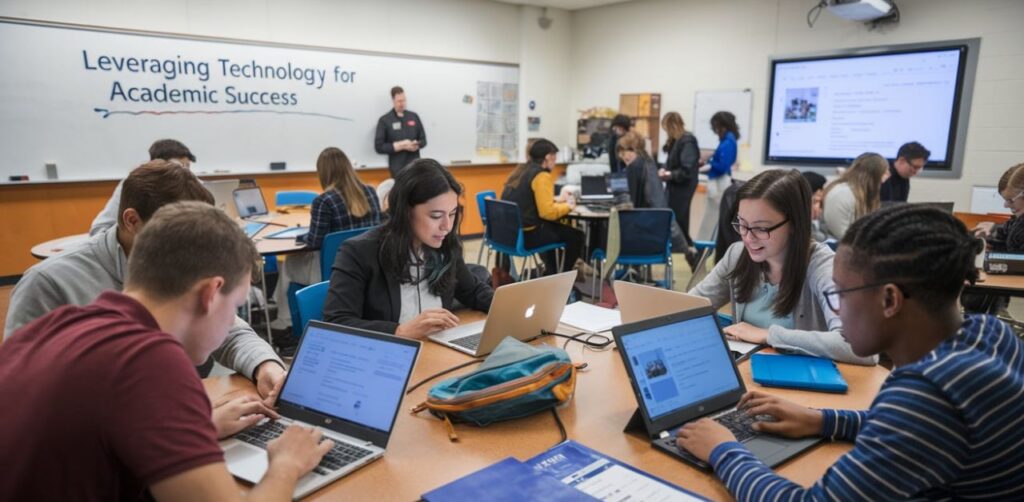Curious about what do college students need to spend more time doing in order to meet long-term academic goals? Understanding the habits and activities that lead to long-term success is essential as they balance multiple responsibilities. Identifying key focus areas is crucial for reaching educational goals.
Academic success depends on effective time management, seeking help, active learning, goal setting, and class participation. To meet long-term academic goals, what do college students need to spend more time doing?
Commitment and discipline on the part of college students help them tackle life more effectively. They need to pay heed to essentials, such as skills and rational choices, which must prepare them well before the actual exams and later in life as well.
Table of Contents
The Importance of Long-Term Academic Goals

It’s the long-term academic goals, which provide direction and motivation to students in their educational endeavors. For example, accomplishing such goals might include maintaining a good GPA, completing internships, or preparing for graduate school; this would be what college students need to spend more time doing.
Students can hence make informed decisions about daily activities by focusing on these goals.
Ways to Achieve Long-Term Academic Goals
- Set SMART Goals: Large goals need to be divided into SMART goals-specific, measurable, achievable, relevant, and time-bound. It gives people an orientation and motivation to pursue the achievement of more tangible and manageable goals.
- Prioritize Effective Time Management: Stay prepared for studying: Explore planners or digital apps for scheduling study commitments. One thing that takes away some pressure is proper time management.
- Seek Support and Feedback: Regular consultation with professors or mentors or peers can be beneficial by guiding and providing constructive feedback toward their action. Such a supporting network helps in developing the personal profile as well as academic development with assured continuity of progress toward goal accomplishment.
Key Areas for Time Investment

To achieve long-term academic goals, college students need to spend more time Regular consultation with professors or mentors or peers may be helpful by guiding and providing constructive feedback toward their action.
Such a supporting network helps in developing the personal profile as well as assured continuity of progress toward goal accomplishment for academic development.
1. Effective Organization and Planning
College students achieve academic success by setting clear goals, managing their time, and seeking support. With dedication, they can reach long-term educational objectives. Learn how to enhance your academic journey with expert tips and trusted strategies.
- Create a system to track assignments, deadlines, and exams.
- Maintain organized notes and study materials.
- Use digital tools or planners for time management.
Investing time in an organization reduces stress and enhances productivity.
2. Dedicated Study Time Outside of Class
Unlock your potential with proven strategies to achieve academic success. Discover expert tips to help you manage time, prioritize tasks, and plan a productive study program. Prepare yourself to succeed and get enlightened to make the right decisions during your college career.
- Set aside specific study blocks for each subject.
- Develop a consistent study schedule aligned with personal learning styles.
- Employ effective study techniques like active recall and spaced repetition.
Regular study sessions outside class lead to better academic performance.
3. Self-care and Stress Management
Learn how students in college can achieve greater success: learn how you will achieve your longer-term goals that you have set in your academics. Learn strategies about managing time and arranging work from the experts.
- Start to get enough sleep and keep a good sleep routine.
- Regular physical exercise.
- Stress-reduction activities, including meditation or mindfulness.
Taking care of mental and physical health improves focus and energy levels.
4. Building Professional Skills and Networking
Unlock your academic potential with proven strategies for success. This guide offers expert tips on managing time, reducing stress, and building skills. Empower your journey with tools to meet your long-term academic goals.
- Attend career fairs and networking events.
- Finding internships or part-time jobs that apply to the field of study.
- Developing soft skills, such as communication or teaming skills.
These activities enhance resumes and provide valuable experiences.
5. Engaging in Extracurricular Activities
Graduate by doing far more than just attending classes, effectively learning how to dominate time management, finding effective study habits, and building networks to help. It will easily lead you up until the day of your long-term academic achievements.
- Join clubs or organizations that align with academic interests.
- Participate in volunteer opportunities to apply classroom knowledge.
- Develop time management and leadership skills through involvement.
Extracurriculars contribute to personal growth and social networks.
Balancing Academic Responsibilities with Personal Life

Do you wish to achieve academic success at a busy college schedule? Explore proven techniques supported by expert research which can aid in the pursuit of long-term goals.
The balancing act between academic and personal life is very important. Students must do their best to:
- Nurture relationships with friends and family.
- Pursue hobbies outside academics.
- Allow time for relaxation to prevent burnout.
- Set personal goals for growth.
- Balance work and life.
Leveraging Technology for Academic Success

Achieving success in college requires more than just attending classes. This guide offers expert strategies for managing your time, reducing stress, and building essential skills.
Learn what do college students need to spend more time doing in order to meet long-term academic goals with trusted and practical tips. Discover how to confidently reach your goals with easy-to-follow advice.
Utilizing digital tools can significantly enhance productivity:
- AI-powered flashcard makers for efficient studying.
- Time management apps for tracking tasks.
- Note-taking applications that sync across devices.
- Interactive learning platforms with personalized content.
- Productivity tools to enhance focus and minimize distractions.
These resources support academic goals when used effectively.
Conclusion: The Path to Long-Term Academic Success
Achieving long-term academic goals involves dedication, strategic planning, and consistent effort. Key elements include organization, dedicated study time, self-care, professional development, and extracurricular activities for a solid foundation of success.
Implementing effective time management strategies while maintaining a balanced lifestyle will empower students to navigate their college years confidently. With persistence and the right tools, they can meet and exceed their long-term academic objectives.
So, what do college students need to spend more time doing in order to meet long-term academic goals? They need to focus on organizing their tasks, setting aside study time, and taking care of their well-being. It’s all about balance and using every resource available to tackle their academic challenges with confidence.
FAQs
What are the most effective time management strategies for college students?
This they do by breaking down work into little manageable chunks, setting clear goals, and being vigilant on their use of a planner to assist them in task prioritization.
How can students balance academic responsibilities with personal life?
Give adequate time for study, relaxation, and social activities while at the same time maintaining a balanced schedule. Consistency breeds a healthy work-life balance.
What role does self-care play in achieving long-term academic goals?
Self-care leads to reduction in stress and increases productivity, giving students focus and energy that may be sustained over time. Continuous self-care practices are what make one successful.
How can extracurricular activities contribute to academic success?
Other qualities that they further develop include teamwork and leadership skills, personal growth, and improvement in academics. This all adds to the richness of college life.
What are the best digital tools for managing academic tasks?
It’s useful, such as using Trello or Notion for task management, Google Calendar to schedule, and Evernote for notetaking. One of the biggest benefits these productivity tools bring is improvement.
People also ask
Which of the following will help you reach your long-term goal?
Break goals into smaller steps, track progress and stay consistent with your efforts.
Which of the following will help you reach long-term goals balancing daily life?
Make priorities, plan the right usage of time, and maintain a healthy work-life balance.
How can managing your personal life help with reach your goals on Quizlet?
Organization in your personal life boosts focus, enhancing your study and goal achievement.
To achieve long-term goals, consider breaking them into smaller steps, writing them down, and maintaining your physical and mental health.
Apart from these, success is promoted by breaking down big goals into steps, writing them down, and staying healthy.
How can managing your personal life help you reach your goals?
Balancing personal life reduces stress, enabling a clear focus on achieving goals.

